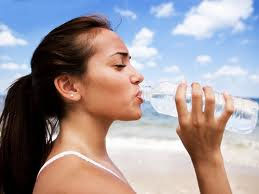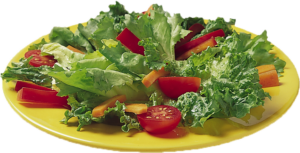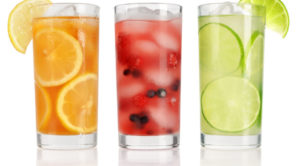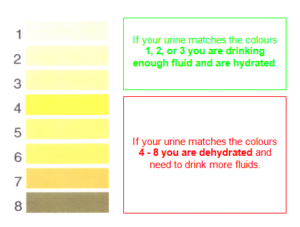 Summer is officially here and in full effect and whether you’re heading to the shore, the lake, or the backyard we can be assured of one thing – it’s going to be hot! Hydration is important all year round, but the return of warm weather is the perfect time to remember some easy ways to stay hydrated all summer long.
Summer is officially here and in full effect and whether you’re heading to the shore, the lake, or the backyard we can be assured of one thing – it’s going to be hot! Hydration is important all year round, but the return of warm weather is the perfect time to remember some easy ways to stay hydrated all summer long.
So, how much do we need to drink each day after all?  We’ve all heard the old “8 glasses of water per day” rule, but what does the Institute of Medicine recommend? The same institution that develops guidelines for vitamins and minerals says the average adult male should drink about 13 cups per day and the average adult woman should drink about 9 cups per day. 13 or 9 cups sounds like a lot, but remember these recommendation are for all fluids. We get fluids from all beverages including coffee and milk, as well as all the food we eat throughout the day.
We’ve all heard the old “8 glasses of water per day” rule, but what does the Institute of Medicine recommend? The same institution that develops guidelines for vitamins and minerals says the average adult male should drink about 13 cups per day and the average adult woman should drink about 9 cups per day. 13 or 9 cups sounds like a lot, but remember these recommendation are for all fluids. We get fluids from all beverages including coffee and milk, as well as all the food we eat throughout the day.
Our bodies need water for a wide range of reasons, many being vital day to day functions. Water helps our bodies regulate temperature, especially important during the hot summer months! Others include normal gastrointestinal and kidney function, essential to long-term health. Certain factors can cause our fluid needs to increase, and incorporating high-water content foods into your diet can help meet your needs. Of course, high heat and humidity you might find during summer or on vacation is one of these factors. Others include strenuous exercise, illness, and pregnancy or breastfeeding. Let’s take a look at some foods you can add to your fridge this summer to help stay hydrated!
 Summer salads are a great way to increase both your fluid and vegetable intake. Cucumbers, lettuce, celery, radishes, tomatoes, green peppers, and spinach are all over 90% water. Alternatively, try baby carrots, strawberries, watermelon, or grapefruit as a refreshing snack. Just like fruits and vegetables, additional beverages can add healthy nutrients to your diet.
Summer salads are a great way to increase both your fluid and vegetable intake. Cucumbers, lettuce, celery, radishes, tomatoes, green peppers, and spinach are all over 90% water. Alternatively, try baby carrots, strawberries, watermelon, or grapefruit as a refreshing snack. Just like fruits and vegetables, additional beverages can add healthy nutrients to your diet.  Milk provides protein and calcium, and most varieties are fortified with Vitamin D. You can get the some benefits from milk alternatives, like almond milk. Coconut water provides electrolytes. Make sure to check the nutrition label on your other drinks for added sugars and reread the Rethink Your Drink blog post for ideas on healthy and easy-to-drink choices.
Milk provides protein and calcium, and most varieties are fortified with Vitamin D. You can get the some benefits from milk alternatives, like almond milk. Coconut water provides electrolytes. Make sure to check the nutrition label on your other drinks for added sugars and reread the Rethink Your Drink blog post for ideas on healthy and easy-to-drink choices.
Now you know some different ways to add more water throughout the day, but it’s still important to learn how to keep track of your hydration level. Common signs of dehydration include thirst, dry mouth, fatigue, and light-headedness or dizziness. These signs are especially important to remember during outdoor exercise or long days on the beach. Believe it or not, thirst is not the best indicator of hydration status. A great way to assess your fluid intake is the color of your urine. First morning urine is the best to use. Ideally, it should be a pale yellow, like light lemonade. A darker color closer to amber may indicate that you’re heading towards dehydration. On the flip side, clear urine may indicate over-hydration which can come with problems of its own.
Common signs of dehydration include thirst, dry mouth, fatigue, and light-headedness or dizziness. These signs are especially important to remember during outdoor exercise or long days on the beach. Believe it or not, thirst is not the best indicator of hydration status. A great way to assess your fluid intake is the color of your urine. First morning urine is the best to use. Ideally, it should be a pale yellow, like light lemonade. A darker color closer to amber may indicate that you’re heading towards dehydration. On the flip side, clear urine may indicate over-hydration which can come with problems of its own.
You’re all set! Get outdoors and enjoy the warm summer weather without worrying about dehydration. Connect with your Registered Dietitian Nutritionist for more information on drinking the right amount of fluid for you.